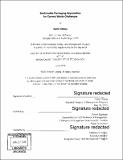| dc.contributor.advisor | Steven Eppinger. | en_US |
| dc.contributor.author | Cheng, Karen,S.M.Massachusetts Institute of Technology. | en_US |
| dc.contributor.other | Massachusetts Institute of Technology. Engineering and Management Program. | en_US |
| dc.contributor.other | System Design and Management Program. | en_US |
| dc.date.accessioned | 2019-09-26T21:00:19Z | |
| dc.date.available | 2019-09-26T21:00:19Z | |
| dc.date.copyright | 2019 | en_US |
| dc.date.issued | 2019 | en_US |
| dc.identifier.uri | https://hdl.handle.net/1721.1/122336 | |
| dc.description | Thesis: S.M. in Engineering and Management, Massachusetts Institute of Technology, System Design and Management Program, 2019 | en_US |
| dc.description | Cataloged from PDF version of thesis. | en_US |
| dc.description | Includes bibliographical references (pages 61-65). | en_US |
| dc.description.abstract | Packaging plays an essential role in protecting a product from damage, attracting consumers to purchase a product, and facilitating storage and consumption. Yet its appreciation and value is quickly eroded once the product is purchased and/or consumed and the package becomes waste. With the passing of China's National Sword policy in 2018, post-consumer materials recycling markets are threatened and resources are not being recovered due to high contamination rates. The development of new packaging material has surged in recent years but has not corresponded with development of the necessary recycling infrastructure. Consumers want to recycle but are confused about how to most effectively do so. Packaging continues to consume our finite resources and pollute our terrestrial and marine environments. This research takes a systems approach to understanding today's emerging waste challenges and identifies key obstacles that society should collectively solve. High impact opportunity areas include alignment amongst all key stakeholders, establishing standardized signage and labels, increasing consumer education, and tackling difficult-to-recycle materials through scaling up technology, enacting policy, providing materials alternatives with corresponding infrastructure, or redesigning packaging. | en_US |
| dc.description.statementofresponsibility | by Karen Cheng. | en_US |
| dc.format.extent | 65 pages | en_US |
| dc.language.iso | eng | en_US |
| dc.publisher | Massachusetts Institute of Technology | en_US |
| dc.rights | MIT theses are protected by copyright. They may be viewed, downloaded, or printed from this source but further reproduction or distribution in any format is prohibited without written permission. | en_US |
| dc.rights.uri | http://dspace.mit.edu/handle/1721.1/7582 | en_US |
| dc.subject | Engineering and Management Program. | en_US |
| dc.subject | System Design and Management Program. | en_US |
| dc.title | Sustainable packaging approaches for current waste challenges | en_US |
| dc.type | Thesis | en_US |
| dc.description.degree | S.M. in Engineering and Management | en_US |
| dc.contributor.department | Massachusetts Institute of Technology. Engineering and Management Program | en_US |
| dc.identifier.oclc | 1119537133 | en_US |
| dc.description.collection | S.M.inEngineeringandManagement Massachusetts Institute of Technology, System Design and Management Program | en_US |
| dspace.imported | 2019-09-26T21:00:19Z | en_US |
| mit.thesis.degree | Master | en_US |
| mit.thesis.department | SysDes | en_US |

